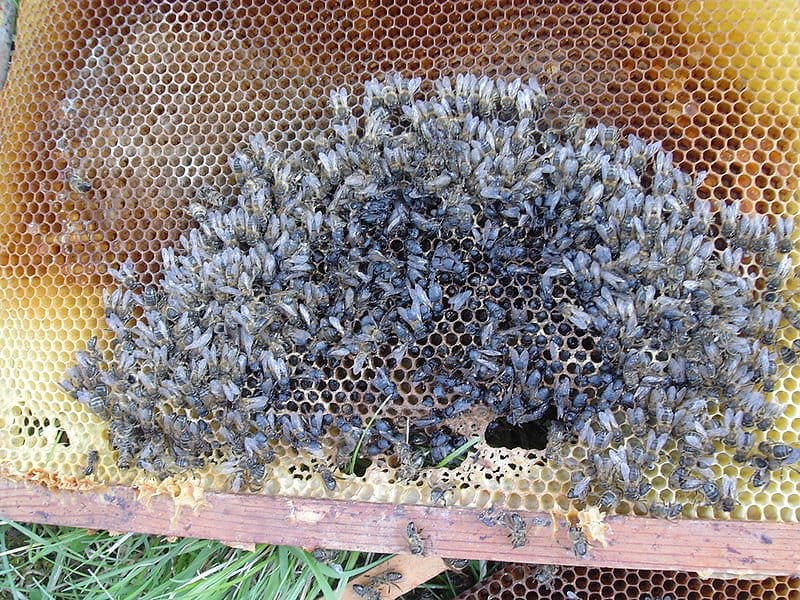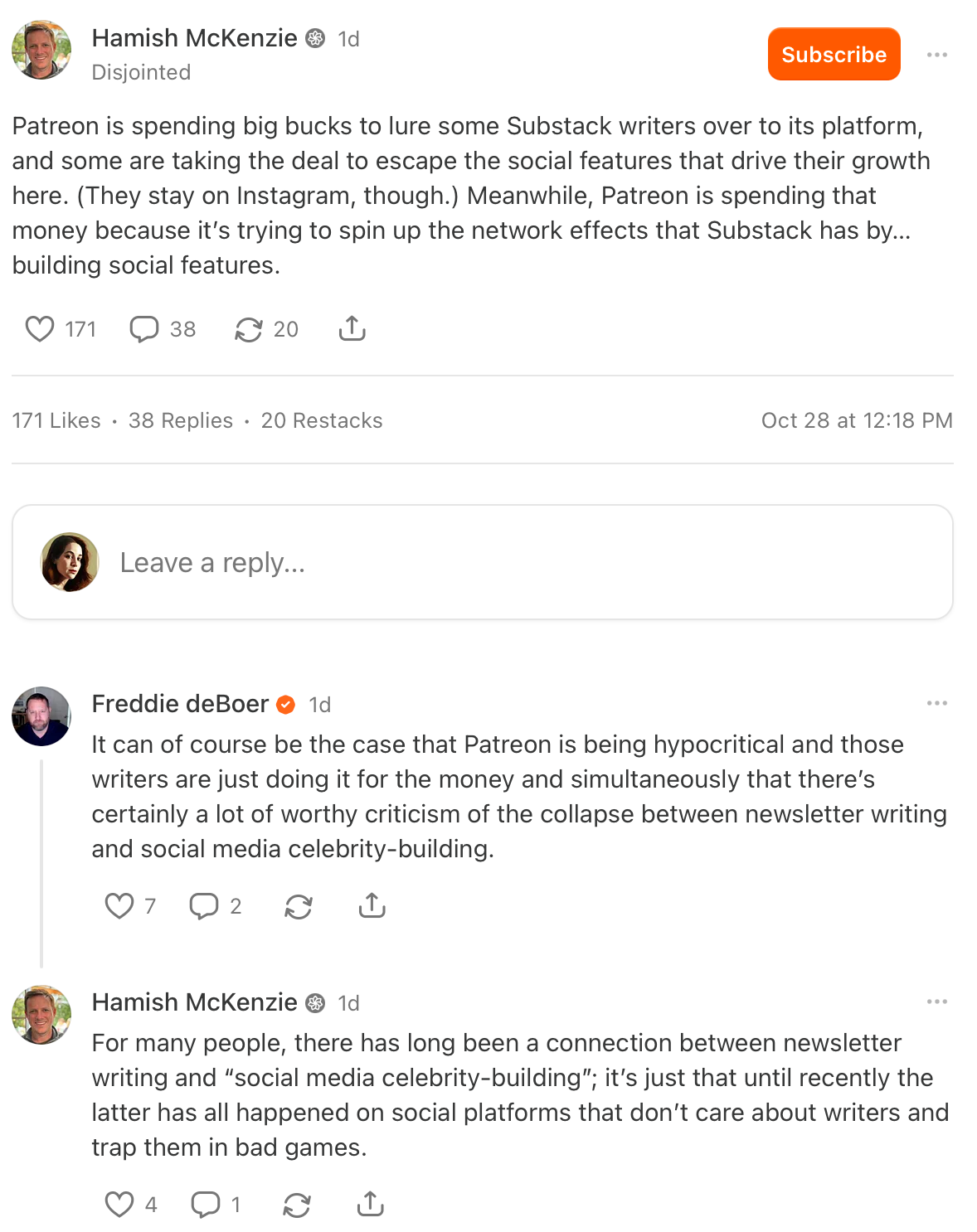Feeds and Fodder

If you are not chronically online (congratulations, please take me with you), you probably missed yesterday's big news in the newsletter world: Anne Helen Petersen, one of Substack's biggest success stories, has decided to leave Substack for Patreon. I don't follow or read her, so I didn't hear this directly, but word gets around.
Substack, as you may know, built a roster of high-ish profile writers through their program called Substack Pro. Substack Pro recruited these writers by offering them six-figure advances to cover their first year's expenses, working under the assumption that a year would be a sufficient amount of time to establish a successful newsletter with subscription earnings equal to or hopefully higher than the original advance. In return, Substack took 85% of the first year's subscription revenues. After that, the writer took home 90% of their subscription revenue, but with no annual guarantee. Basically a "quit your full time job, do this for a year, see if you can establish something successful, we're happy to bet on you" model, not unlike venture capital. We can assume these writers benefited in other, less immediately tangible ways too: Increased visibility, lots of promotion, Substack driving traffic to the newsletter. After all, Substack has a real vested interest in these Pro newsletters. Not only do they want to recoup their original investment, they want to profit. Who wants to break even?

Now, of course, Patreon is doing the same thing: Luring away Substack's marquee writers/podcasters and building out their newsletter functionality, along with other social features that have helped these creators build such big followings on Substack. Unsurprisingly, Substack is Big Mad about this.

Anne Helen Petersen was one of the original writers who benefited from Substack Pro when she joined in 2020, and she has been one of their biggest success stories. There's a lot I could say about her decision to leave: Why she made it, why she made it when she did, why she's chosen to head to Patreon. She says making this move is another example of her being ahead of the curve, an assertion which might make the discerning reader cock an eyebrow. Is it ahead of the curve to take a moral stance people have been urging others to take for :checks notes: three and a half years now? Especially when now is the moment Patreon is offering money to Substack's top superstar creators, and asking them to help shape the newsletter offering Patreon is building? Who can really say.

But the truth is, I don't want to write about Anne Helen Petersen. Not because I know it will come across like sour grapes, which, fair. I cannot lie! I too would love to have money thrown at me to establish my newsletter and online presence. I too would love to have massive audiences directed at me, all while having the resources to build and foster the kind of community that is meaningful to me. I too would love if more people paid for my writing, since it is work. (Gentle reminder that paying is an option!) I'm not saying she didn't work hard to build what she has, just that hard work alone is often not enough to launch you into the stratosphere, especially not when you're working on or in the vicinity of platforms that, by their very design, can enable a select few over the vast majority of others.
No, I don't want to write about Anne Helen Petersen because, successful though she is, she's just another node in complex network. She's a big cog in a much bigger machine, which means she contributes to the problem she thinks she's helping ameliorate. She's not the problem itself though, and the problem itself is what's worth writing about. You know me! Why write something that will get people riled up and get me attention when I can write about the thing none of us really want to confront. It's such a winning formula!
Do you remember the original promise of the internet? Or one of the original promises, anyway, as there were many, which was part of what made it so exciting. On the internet, we were all going to establish our own places, be our own selves, own our own data. We were not beholden to all the traditional institutions and infrastructures because those didn't really exist online! When I first went online in 1992, if you weren't on CompuServe, Prodigy, or AOL. it was all telnet chat rooms and PINE mail servers and BBSes. I didn't even see a web browser until 1993! I still distinctly remember this moment, in a computer lab on the Berkeley campus, because it was so cool. Even in the late '90s, the web was still goofy as hell.
It's interesting to see the nostalgia that has swept so much of social media in recent months. A lot of this nostalgia comes from Gen Z, or even from kids too young to be a Zoomer: Nostalgia for a world they never experienced, just like all of us wanting to dress like it was 1958 or 1969 in the 1980s or 90s. Every day online, whether on Instagram or Reddit or whatever, I come across moments in which people are genuinely delighted about a supportive interaction or a really funny joke that cascades down a comment thread. Or I see someone say "Remember when the internet was more like this? What happened to all those quirky individual websites where people just shared the random stuff they were into?"
The internet was like that for a few important reasons, including:
- Decentralization
- Few (if any) walled gardens, and
- No all-inclusive, all-encompassing platforms where someone (not you) controlled what you saw and owned your data.
Also, those sites existed because people made an effort to create them, to update or share or write regularly. They also made an effort to visit the blogs they knew and loved, to comment and participate, to consume a not-yet overwhelming amount of content.
The problem with Substack is not simply that Substack platforms and profits from Nazis. It sounds crazy to say this, because Nazis are bad, but the problem with Substack is actually much bigger, much deeper, much more foundational. The problem with Substack is also the problem with Patreon, with Instagram, Facebook, TikTok, X. I've said this before and it's the hill I will probably die on:
These massive platforms can create incredible features. They can curate content, help you find stuff you're interested in without making you do much work, introduce you to cool stuff and cool people. They can help Online feel less Overwhelming. Seamlessness, functionality, lots of stuff to engage with right away. You know the drill: Infrastructure and inventory.
One of the dirty little secrets of content-driven platforms is that the vast, vast, vast majority of traffic/consumption/revenue is generated by a shockingly small percentage of creators. It may seem to you that we're all contributing to this great and overwhelming tsunami of stuff being thrust at us every time online. Most of us are, at best, mid-tier. At best! If we're lucky! We're probably not even close to mid-tier! This is true on Instagram, it's true on Spotify, it's true on Substack. The big consistent accounts, creators, and celebrities drive the bulk of the metrics. It's in a platform's best interest to grow their roster and avoid being so dependent on a small group of creators. They have to encourage and foster the upper-mid-tier creators, try to grow everything across the board, while also keeping their superstars happy, because big names can easily decamp when a better offer comes along. Sorry, I mean when they realize ahead of everyone else the ethical ramifications of staying in the bad place.
So yes, platforms like Substack or Patreon are fun buzzing hives with lots of inventory (again, that's you). They have great features and can get you big audiences! But then they change, and they will always change. The ecosystem of a proprietary platform is designed to support the platform itself, not the creators who make it successful. Want proof of this? Substack admitted to making changes to their algorithms that limit how much reach some newsletters have, specifically newsletters whose content is mostly free. So unless you locked some or most of your content behind the paywall, your newsletter would no longer be promoted the way you had been before, and you would see significantly less subscriber growth. Why would they do this? Because they can't make money off you if you're free.
You might say, hey that's fair. Good features come at a price. You'd be right! You just have to decide what that price is. For example, I pay for Ghost even though I don't make a much money doing this newsletter. (Again, you can change that if you like.) I choose to pay a flat fee for fewer features than be beholden to a platform in exchange for really amazing built-in community features like newsletter-specific chat rooms. Is the Notes feature on Substack somehow more mid than even Threads? Yes, but it is nice to have everything in one place. Everywhere you comment or engage is an opportunity for a new subscriber to find you. Commenting is seamless because you're already logged in, doing your thing. You can promote from within the ecosystem, rather than going over to Bluesky and remembering to look at the Mastodon social feature in Ghost and having everything be disjointed and lonely and so much more work.
Side note: Ghost, if you're reading this, having to log in separately as a subscriber to my own newsletter in order to comment is a terrible user experience. Please email me, I will help.
This price is what I'm getting at. Everything comes at a price. What price are you willing to pay? If the price is your well-being, the fabric of society, and democracy, then by all means, keep letting someone else do the work of promoting and curating for you.
Earlier today, a dear friend asked me what a solution would look like. She said that people have tried over and over again to build new platforms, to build alternatives, and no one has succeeded. I said, the solution isn't in building a new platform. It's in making the decision as individuals to take advantage of what little choice we have left to us. Sociology 101, Karl Marx-lite: You can choose whatever you want from the menu, but is that really free choice? After all, who chose what's on the menu?
Here we are, on the internet, where it feels like we have too much to choose from, we're so overwhelmed at every moment. But what choice is there really? Substack or Patreon? That feels like Coca-Cola or Pepsi all over again. Neither of them are good for us. I don't want us to build another full-service platform. I want us to build an internet that doesn't trap and own us. I want us to be okay with not making billions of dollars from our unicorn startup, or millions from our newsletter, if it means other people have to fight for survival. Rather than move to a new platform, what if we focused our efforts on making decentralized experiences more user-friendly? Coming up with solutions to help people build audiences and find content that's meaningful to them—solutions that are based in their needs, not based in business need and retrofitted to what we think humans will use.
How can we undo our need for virality and unsustainable success? How can we build opportunities for people to make a living without having to kill themselves doing it? Do we all have to have hundreds of thousands of subscribers? Is success only about big numbers or is it also okay to have smaller groups of truly devoted readers and followers? I don't have the answer to this one, and I wish I did. I don't want to long for blockbuster success, because what's fundamentally most important to me is that we find a way out of this hollow, godless, bullshit Ponzi scheme, where I have to pay for the benefit of having an influencer share an affiliate link that earns them additional money in a chat room they pass off as community.
What if it's time to do the hard work of being a human being in the world?
This is why, when my lovely 25-year-old friend asked me what I thought about Substack, I didn't know what to tell her. Could she join and build a big audience? Probably. Would that audience be engaged, would they pay for her work, would they follow her if she had to leave Substack? I don't know. Would Substack support her as a creator in the long run? Probably not. But do I have a great solution to offer her right now? No.
I want us to move away from these models where everything is centralized, where we're beholden to tech giants, and where our worst behaviors and instincts are encouraged and enflamed. I want the internet to be repopulated with funky weird websites about whatever random hobby or interest you have, outside of Substack, beyond the Instagram explore page, away from the relentless onslaught of TikTok's eternal scroll. I want us to put our bullhorns down and stop vying for virality. Maybe be okay with a smaller audience, as long as they care about nuance and figuring out a better way forward. I know that this is a lot to ask of my lovely 25-year-old friend, who is not immersed in internet world building like I am, who does not spend all day thinking about how people communicate, and who just wants to write and find her audience without feeling like she's out here in the cold. I wish I had a better, easier solution to offer her.
Do you want to help me build it?
Until next Wednesday.
Lx
Leah Reich | Meets Most Newsletter
Join the newsletter to receive the latest updates in your inbox.

